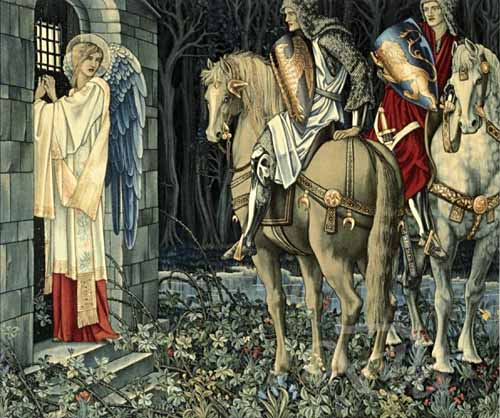Friday
Can Sir Gawain and the Green Knight be read as a commentary on Donald Trump’s lack of shame? So argues Seeta Chaganti, a medievalist at the University of California, Davis. While I interpret the romance differently than Chaganti, I like how she uses the poem to engage with her distress over the president.
As Chaganti reads the poem, Gawain momentarily abandons shame in order to save his life, accepting and hiding from the lord of the castle a life-saving green girdle from his wife. For the most part, Gawain has been an exemplary knight, but here he abandons his knightly code for a base motive. When he is later exposed by the Green Knight, he is filled with self loathing—so much so that he tries to shift some of the blame to women. He is still beating himself up when he returns to Camelot.
Chaganti believes Gawain’s sense of entitlement allows him to sidestep his shame. When he does this, the shame dissipates, although she gives a rather fuzzy and not very convincing explanation of how this happens. She also says that this dissipated shame becomes “a sharp point set loose to lodge collaterally in his watchers,” with the result that Gawain escapes scot free while observers shoulder it:
[W]hen an enfranchised protagonist (a knight, a politician) is coddled to cast off shame, that shame becomes a sharp point set loose to lodge collaterally in his watchers…
Here’s how shame shifts in the Trump era:
A year and some days since our presidential election, the Trump administration has driven that sharp point into me. I am pierced by the shame he refuses to feel. I see Trump as merely intensifying what are in fact longstanding injustices and evils; I see myself as accountable for my belatedness in resisting them. And I know that even as I try to do better, I am complicit still.
I find this intriguing although it’s not something I experience. I’d like to focus here, however, on whether Trump has in fact cast off shame.
I think that Trump is obsessed with shame, only he has found ways to hide from it. He is ashamed of his small hands, of not being the president that Barack Obama was, of failing to make the cover of Time Magazine. Whatever the cause—a cold mother and an emotionally abusive father are in there somewhere—it is hell being Trump. He copes by bullying women, boasting about his successes, undertaking grandiose projects, living a lavish lifestyle, and seeking the presidency.
In the process, he abandons normal decency and codes of ethical conduct. He handles shame, in other words, by acting shamelessly. He also attacks anyone who reminds him of his shame.
As a result, the chivalric code hasn’t looked this good for a long time. Sure, Gawain is wound rather tight, but isn’t suppressing one’s emotions preferable to a Trumpian acting out? If the fear of being shamed keeps anarchic forces at bay, maybe we should give shame a second look.
Except that the Green Knight, as Gawain’s internal nature, is unimpressed. Gawain has so wrapped himself up in the ideological armor of his Christian knighthood that he can’t acknowledge to himself how much he fears dying. He’s so afraid of appearing afraid that he shuts down his emotions altogether. Nature bulls its way into Arthur’s court because it wants Camelot to acknowledge that it has feelings beneath its stoic exterior.
In the end, Gawain kind of acknowledges and kind of doesn’t. Nature gives him credit for showing that he cares for his life but dings him for being sneaky about it. It’s unclear whether Gawain learns the lesson Nature has been trying to teach him. Instead of writhing in embarrassment for revealing his fears, he should openly acknowledge his humanity. Real men are okay with flinching.
Trump and Gawain represent two opposite ways of dealing with shame, neither one healthy. Trump handles his anxieties by behaving like Prince Prospero in Edgar Allan Poe’s “Masque of the Red Death,” another rich man who parties wildly to drown out fears of death. Gawain, on the other hand, is emotionally paralyzed. Trump is the decadent 1970s, Gawain the repressed 1950s.
Shame is useful for keeping us in check, and Chaganti is right that we could use more of it at a time when lying and rudeness have become second nature. Sir Gawain and the Green Knight is not the best advertisement for reviving it, however.
